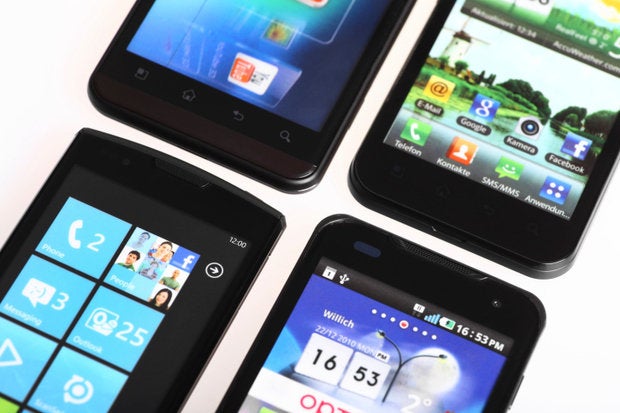Later this week, Microsoft may debut a new lineup of Windows 10 smartphones, dubbed the Surface Phone by the Internet rumor mill, to replace the all-but-dead Windows Phone-based Lumia devices it bought from Nokia in hopes of overcoming the deep dominance of iPhones and Android smartphones. Or it may not.
The truth is, it doesn't matter if Microsoft revitalizes its mobile platform -- because it doesn't need its own mobile platform.
Microsoft has stopped trying to beat iOS and Android on their terms. Instead, the company has largely accepted that smartphones run iOS or Android, so it has made its software work on those platforms. The strategy used to be "Windows everywhere"; now it is "Microsoft everywhere."
That sea change means Microsoft doesn't need people to use smartphones running Windows 10 for Mobile, the new name for Windows Phone. (It has been in no rush to get those users, of course: The first, poor-selling Windows 10 smartphones came out in December, and Windows 10 Mobile became available only in mid-March for some older Windows Phones, much later than originally promised.)
Microsoft apps and services increasingly don't care if you use Windows
Whether you use an iPhone, Android smartphone, or Windows smartphone -- or tablet -- you can run Office, Skype, Outlook, and more, and be powered and managed by Azure, Exchange, Intune, System Center, and Office 365. Microsoft gets your business regardless -- and keeps competitors at bay.
I remember when Apple's iWork suite dominated iOS productivity, becoming the only viable choice on iPads and iPhones, which had come to dominate the enterprise mobile market. That opened the possibility, especially in the face of rising Mac sales and declining Windows PC sales, that Office could be sidelined or at least diminished. But a year ago, Microsoft delivered a very good Office suite for iOS, then followed up for Android and OS X -- vaporizing the iWork threat and cementing Office's status as the universal business suite. Mobile Office has only improved since.
Microsoft is now doing that for Outlook, whose mobile clients have been much less capable than Apple's and Samsung's native clients. Mobile Outlook is improving regularly, and I expect before the year is out it will be as capable across the board as it is now on Windows.
Its Office 365 collaboration suite is the Achilles' heel in Microsoft's shift from Windows-centric to Microsoft-centric; it remains mostly useless outside Windows PCs. I suspect that will change, too, but not for a few years. Still, I believe it will happen.
The evolution of the tablet favors Microsoft as well
An IDC survey earlier this month created a brief buzz because it showed Microsoft dominating the detachable-tablet market. When you think "tablet," you think "iPad," so the survey suggested Microsoft's Surface Books would displace the iPad, which dominates business use, and Android tablets, which dominate causal entertainment use.
The detachable-tablet market, however, is a sliver of the actual tablet market, a sliver I would have called, until recently, one made up specifically to let Microsoft win in an emerging-hardware category. After all, a Surface Book is simply a laptop with a detachable keyboard. It runs Windows, which is why many people like it -- especially IT admins who distrust Apple and Google. Its so-called tablet mode is a poor experience and seems designed to make sure you stick with the full Windows instead. A Surface Book is not a truly different type of device, unlike an iPad or Android tablet.
Apple and Google have legitimized the detachable-tablet market by joining it, with the iPad Pro and Pixel C, respectively. Both leave me underwhelmed because the more you try to make an iPad-style tablet be a laptop, the more you want an actual laptop. If an iPad evolves to be a computer with a detachable keyboard and wireless pointing device, it has no strong reason to exist alongside a MacBook Air.
Plus, you've always been able to use a Bluetooth keyboard with an iPad or Android tablet, so what's the real value of a detachable keyboard on those devices? In the case of the iPad Pro, Apple seems to think it's actually the Apple Pencil ... maybe. Google seems to have no real differentiation for the Pixel C. For Microsoft, the Surface Book's differentiation is running full Windows and being a laptop.
Microsoft has never offered a version of Windows Phone for tablets; on its devices, you get full Windows with that anemic tablet mode -- or nothing. Maybe that was prescient; maybe the iPad-style device was merely a transitional device for more-portable computing. If so, Windows Phone -- er, Windows 10 for Mobile -- definitely doesn't matter for tablets. Regular Windows does.
If a place remains for iPad-style tablets distinct from laptops with detachable keyboards, then what's going on in the smartphone world still applies: It doesn't matter what operating system they run because they also run Microsoft's apps and services.
With or without Windows Phone -- both on smartphones and tablets -- Microsoft wins, even if iOS and Android continue to win, too.






